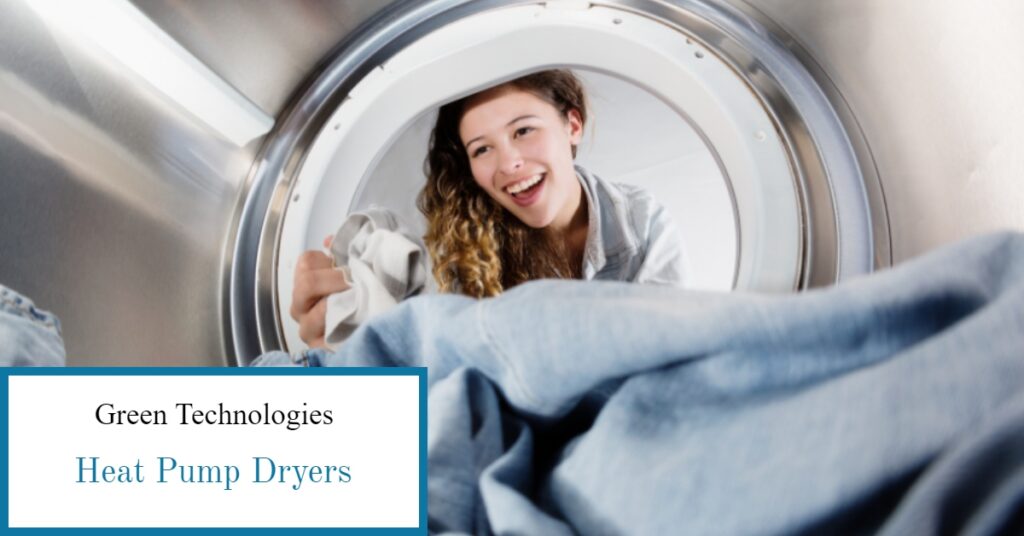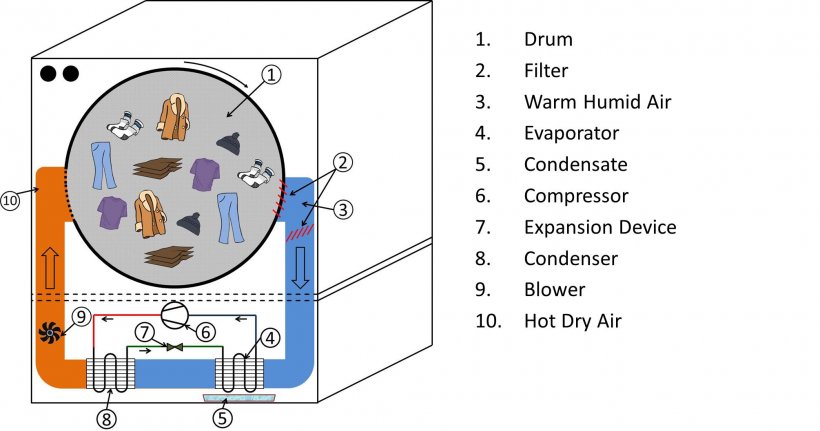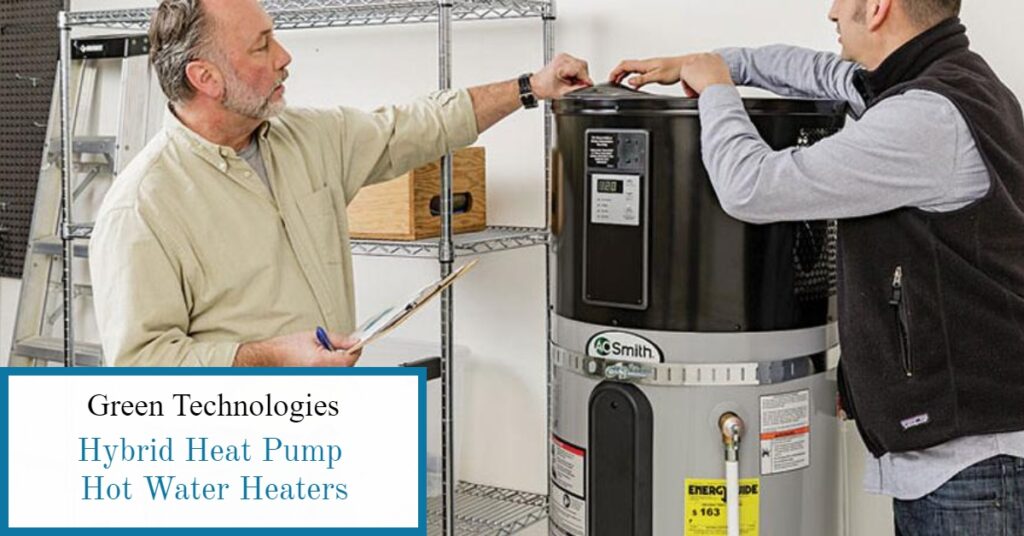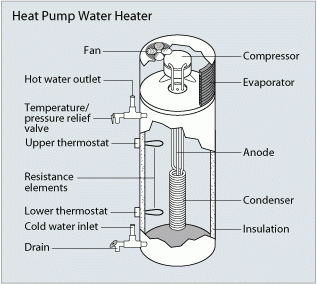Category: Green Technologies

Heat pump dryers are new in the United States, but heat pump dryers have been in use in Europe for a while now. Heat pump technology has been around since the 1940’s and has evolved. Now many appliances in the home have this technology. Whether it is a heating/cooling system, hot water heaters or a heat pump dryer this technology is saving money and reducing our carbon footprint. Let us face it the savings alone with most of these systems saving 50 to 60% in energy usage is reason enough to consider this technology for any new appliance purchase. While each of these systems save money, they all have a few drawbacks as well. Therefore, do some research before making the final decision.
Heat Pump Dryer Technology
Heat pump dryers use the same technology for drying clothes as a heat pump water heater does for heating water. The air is pulled into the unit and heated via a compressor then forced at a higher temperature into the drum. This pulls air across the clothes which dries them. The water in the moist air is collected when the air is passed back through the compressor to complete a cycle. The water is deposited in a compartment for easy removal and emptying. Some larger heat pump dryers offer a drain tube which can be installed to drain into any septic system.

The removable compartment is a great option as the collected water can be used to water plants or any number of other uses. This saves water and is handy in areas where water consumption is of consideration. The compartment needs to be emptied after a few loads. If this is not in your lifestyle then it would be best to choose to install the drain tube which will automatically drain any water collected. The drain tube can be installed into the washer drain or into a sink drain.
Another notable feature of the heat pump dryer is that it does not require a vent to the outside. This means that it can be used in small areas including a closet. Along with the fact most can be plugged into a 110 outlet. While other dryers require a 220 outlet. These features open a whole new world of possibilities for dryer ownership.
As a bonus the clothes dried in a heat pump dryer are softer and have less wrinkles due to the type of heat produced. This helps save money because clothes do not wear out as quickly and need replacing. Towels and sheets are super soft and feel like new.
Heat Pump Dryer Things to Consider
Some things to consider before purchasing a heat pump dryer. This technology takes longer for clothes to dry. Therefore, if you have a large household with a lot of laundry the heat pump dryer may not be a viable choice. The average drying time is between one to two hours depending on the size of the load and the type of material being dried. Also, the drum size is smaller than electric or gas dryers.
Secondly, the upfront cost is higher for a heat pump dryer. The typical cost of an electric dryer is between 500 and 750 depending on the features of the dryer. The typical cost for a heat pump dryer is between 1,000 and 1500 depending on the features of the heat pump dryer. While the upfront cost is higher the energy savings help offset that cost and eventually recover some of the added expense.
Thirdly, heat pump dryers have a secondary filter to collect lint. This extra lint filter will require being cleaned after every 5th load of laundry. The one closest to the drum will need to be cleaned before every load. In addition, the compartment where the condenser is located needs to be vacuumed or brushed once a month. Keeping the lint filters and compressor clean help reduce drying times and keep the efficiency level high.
Lastly, if the incorrect amount of laundry detergent is used to clean the laundry a smell may develop. This smell can be removed by a secondary rinse and adjusting the amount of laundry detergent being used. Buildup on laundry can go unnoticed in a conventional dryer and cause clothing to deteriorate faster. Once the correct laundry detergent is gauged the second rinse can be discontinued.
Before Deciding
To summarize, making the decision to purchase a heat pump dryer will help the environment as well as reduce the cost of drying clothes. Saving money and helping the environment is a win, win situation. Make sure a heat pump dryer will work for you and your schedule. If the maintenance will not fit into your schedule choose a different option. Knowing the pros and cons will help you make the right decision.

Hybrid heat pump hot water heaters do not generate heat like a conventional hot water heater. Instead, they use electricity to move heat from one place (ambient air) to another (hot water tank). To move heat, they work like a refrigerator only in reverse. Hybrid heat pump hot water heaters use the air around the unit to generate the energy needed to heat the water but at a higher temperature conversion rate. Therefore, heat pump hot water heaters are more energy efficient than conventional hot water heaters. Increased efficiency means lower energy bills and greater savings over the life of the heater. Typically, 20% of electric bills are for heating hot water, a hybrid heat pump hot water heater cuts the cost of producing hot water by 73%, thus saving money.
How Hybrid Heat Pump Hot Water Heaters Work:
Heat pump technology has been around since 1948 and over the years has seen major improvements. The units are smaller, quieter, and more efficient than before. In 1948 American inventor Robert C Webber was experimenting with his deep freezer system and accidently burned his hand on the outlet pipe of the cooling system. As inventor minds go, he worked on a way to utilize this wasted heat. Before long, the first heat pump was built and used to heat his house and provide hot water for his family. Since then, technology has advanced, and the first large systems are now smaller and are more efficient.
Heat pump technology uses the ambient air around the system to heat or cool homes and businesses. Ambient air by definition; is air immediately surrounding of or relating to the immediate surroundings. The principle is the same as how a refrigerator cools but in reverse. A heat pump uses a compressor to take heat from the surrounding air and transferring it into a room. It uses this same principle to transfer heat at a higher temperature rate into the storage tank to heat water. Whereas a refrigerator uses the compressor to remove heat from the inside of the refrigerator and transfer it out into the air. Heat pump hot water heaters have a backup system of resistance elements. Resistance elements are used in conventional hot water heaters. The elements will be used when the ambient air temperature in the room is not high enough to operate the hybrid heat pump hot water heater efficiently. The ambient air temperature range for heat pump hot water systems is between 40°F (4.4°C) to 90°F (32.2°C).
What Size Hybrid Heat Pump Hot Water Heater?
Hybrid heat pump hot water heaters come in a variety of sizes. Which one will work best will depend on usage and family size. First determine the typical usage of the household. Is there a dishwasher, washing machine, how many showers a day are all things to consider before purchasing a system. Once there is a general idea of the type of usage choose the one that will suit those needs. If in doubt chose the next size up to be safe.
The most popular sizes for heat pump hot water heaters are 50-, 66-, and 80-gallon systems. The 50-gallon system is best for a two-person household. Then the 66-gallon system will work for a three to four-person household. Lastly the 80-gallon system is best for households of five or more people.

Settings and Features
Each system has a user interface or control panel. This easy to operate panel controls temperature settings, mode of operation, and diagnostic error reporting as well as providing the user with several programming options. Many have up to 99 programmable days available. This provides the user with many options for ultimate savings.
The modes are Efficiency, Hybrid, Electric, and Vacation. First, Efficiency Mode is when the system relies on heat pump technology or the compressor only to heat the water. Next, Hybrid mode will automatically adjust between the compressor and elements to match the demand for hot water. This means it will use the compressor to heat the water but when the demand is greater it will switch to the heating elements to meet the demand. The next setting is Electric Mode. Electric Mode is using the elements only which is the same as a conventional hot water heater. Lastly is the Vacation Mode. Vacation Mode drops the temperature of the water to 60 degrees. This will save money while away from the house for extended periods of time. It will also offer freeze protection while away.
Heat pump hot water heaters are insulated with an environmentally friendly non-CFC foam insulation. CFC is Chlorofluorocarbons which are used to propel the foam insulation onto a surface. They are recognized as a major contributor to ozone depletion. The Stratospheric ozone layer affected by the CFC’s helps protect the Earth and us from harmful ultraviolet rays. Therefore, the heat pump hot water heaters help save on electricity and protect the Earth from ozone depletion.
Another environmentally friendly aspect is the type of refrigerant used in self-contained heat pump units such as hot water heaters. The heat pump unit situated at the top of the hot water heater uses environmentally friendly R134a refrigerant. This type of refrigerant has zero ozone depletion. Lastly, each system has a safety feature called a dry fire protection control. This system checks to ensure water is present before firing the system. Therefore, it protects from burning up the elements prematurely.
Warranty and Other Useful Information
A conventional hot water heater typically last 8 to 12 years with the average warranty being about 6 years. The hybrid heat pump hot water heater typically last 13 to 15 years with a 10-year warranty. Not only does the system last longer, but the warranty also gives 4 extra years of peace of mind. As a bonus many manufacturers are offering rebates which helps reduce the price difference between a conventional hot water heater and the heat pump technology systems.
UEF is used to determine the efficiency of any electrical appliance. UEF stands for Uniform Energy Factor. In this case the UEF is the percentage of energy turned into hot water. The higher the UEF number, the unit will be more efficient and the less it will cost to operate. As an example, the typical UEF for electric hot water heaters is .65 – .95 and a hybrid heat pump hot water heater is 3.42 for a 50-gallon system, 3.52 for a 66-gallon system, and 2.73 for the 80-gallon system. Therefore, it is 300% more efficient than the conventional system resulting in lower heating cost.
How does a hybrid heat pump hot water heater last longer than a conventional system? Inside each system are anode rods. Anode rods attract the contaminants such as minerals and sediment in the water which protects the tank from corrosion. The ones inside the hybrid system are made with a stainless-steel core which last longer and offers better protection against corrosion. Inside the 66 and 80-gallon tank are two rods doubling the protection.
Things To Consider:
A hybrid heat pump hot water heater is taller than a conventional hot water heater. Make sure it will fit in the space designated. While the heat pump hot water heater is great for basements or garages it is best to remember that they are electrical equipment and generate noise. If installing in a small space, which can be done with an air duct adapter kit, think about if the noise will be bothersome. The noise is equivalent to a window A/C unit running. The systems become less efficient the lower the temperature is, therefore, if the area goes below 40°F consistently, it might be better to locate it in another place. Lastly, a little regular maintenance such as washing the filter will go a long way to keep the system running efficiently. Filter maintenance is minimal but important. Two times a year take a damp cloth and wipe the filter, then rinse it under running water and allow to air dry. This simple step will keep the filter clean and the system running efficiently.
Hybrid heat pump hot water heaters, while more expensive to purchase, offer greater savings on electricity cost. Thus, paying for themselves quickly. Deciding to use a heat pump hot water heater has many benefits and a few things to consider before purchasing. In other words, make sure a heat pump hot water heater will meet the hot water needs before purchasing. As always, use self-storage to help with any remodeling projects.
Recent Comments